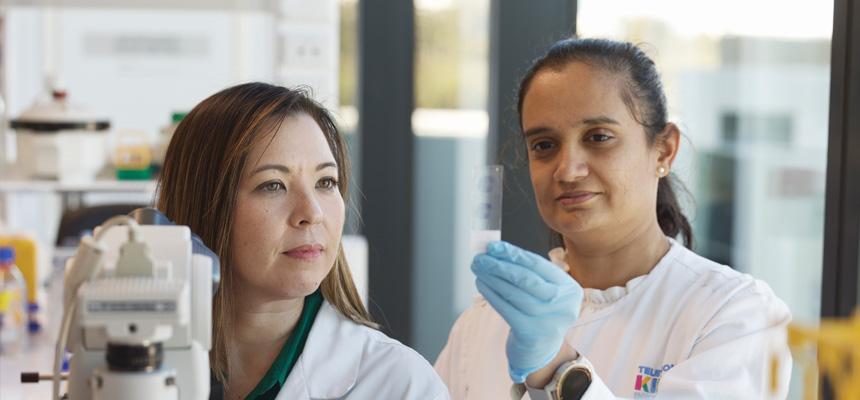Search

The WA Kids Cancer Centre has a suite of world-leading research projects to unlock new treatments for childhood cancers.
Research
Functional genomics in cancer immunotherapy: Computational approaches for biomarker and drug discoveryThis review explores computational strategies to yield biological insight into the processes involved in the immunotherapeutic response
Research
novel small molecule that kills a subset of MLL-rearranged leukemia cells by inducing mitochondrial dysfunctionThis study thus identified a novel small molecule that rapidly kills MLL-rearranged leukemia cells by targeting a metabolic vulnerability
Research
A CHAF1B-Dependent Molecular Switch in Hematopoiesis and Leukemia PathogenesisHere we report that CHAF1B is required for normal hematopoiesis while its overexpression promotes leukemia
Research
Abdominal Imaging at Initial Diagnosis and Following Relapse in Children With Acute Lymphoblastic LeukaemiaAcute lymphoblastic leukaemia (ALL) is the most common paediatric malignancy and remains one of the most common causes of cancer-related death in children and adolescents. It is characterised by the proliferation of immature lymphoid cells capable of infiltrating bone marrow, blood and extramedullary sites. Five-year overall survival rates exceed 90% with current multidrug chemotherapeutic regimens. This manuscript reviews the abdominal imaging features of leukaemic infiltration in children with ALL at the time of initial diagnosis and following relapse.
Research
Clinical Characteristics and Outcomes of Central Nervous System Tumors Harboring NTRK Gene FusionsTropomyosin receptor kinase (TRK) fusions are detected in less than 2% of central nervous system tumors. There are limited data on the clinical course of affected patients.
Research
The Role of Friends in Supporting Young People With Cancer: A Scoping ReviewPeers play a crucial role in supporting wellbeing and psychosocial development for young people aged 12-25. However, a cancer experience often leads to challenges maintaining friendships. There have been no prior attempts to map or synthesise available research or resources on support specifically from friends for young people with cancer, limiting the capacity to draw conclusions or determine next steps for how to best support young people with cancer. This review aims to address this gap by mapping and synthesising the available literature and resources.
Research
Returning raw genomic data to research participants in a pediatric cancer precision medicine trialIn pediatric cancer precision medicine clinical trials settings, parents proactively seeking treatment and answers to causation may request return of their child's raw data and/or biospecimen. To satisfy such requests, the ZERO Childhood Cancer Program required a guidance document.
Research
KMT2A-rearranged acute lymphoblastic leukaemiaKMT2A-rearranged acute lymphoblastic leukaemia (ALL) represents a high risk subtype of childhood ALL. Historical treatment strategies have comprised of intensification with conventional chemotherapy. However, outcomes have remained consistently poor compared to the advances that have been seen for other ALL subtypes, particularly for infants diagnosed before their first birthday
Research
Invasive fungal disease and antifungal prophylaxis in children with acute leukaemia: a multicentre retrospective Australian cohort studyInvasive fungal disease is a common and important complication in children with acute myeloid leukaemia (AML). We describe the epidemiology of IFD in a large multicentre cohort of children with AML.
